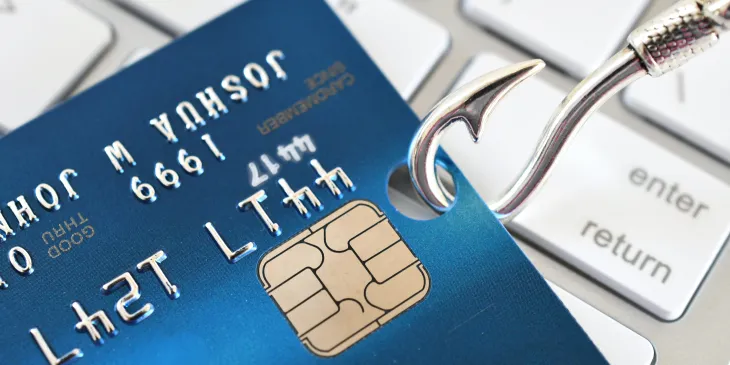How to Ban Scams from Fake Checks to Online Shopping and More

Your phone rings. Yet another automated call informing you that your auto warranty is about to expire. Your best option is to press one to speak with an agent about extending the warranty period, or is it?
Robocalls are one of the most common scams Americans face today, and scam artists use many approaches to trick you. It might be an auto warranty renewal, a hotel reservation, an award you won – even if you never entered a drawing for it – and more. Still, robocalls are only one of the many avenues scam artists use to trick you.
Approximately 68.4 million people fall victim to phone scams yearly, and that number is growing. However, there are ways to protect yourself from scam artists based on the approach you encounter.
Robocalls
Don’t disregard every automated call. Some automated calls are from legitimate companies using them for telemarketing, alerts and notifications, account updates, and more. Nonetheless, many robocalls are from scam artists.
The Federal Trade Commission recently took legal action against one Voice over Internet Protocol (VoIP) service provider to stem the flow of some robocalls into the country. However, this step is just the beginning, and it won’t stop them all. So, here are a few ways to protect yourself.
- Avoid answering calls from phone numbers you don’t recognize.
- Register your number with the National Do Not Call Registry.
- Never give your personal or account information to robocalls or agents who answer.
- Practice caution if the caller answers and pressures you for information; it’s often best to disconnect the call.
- Never assume the number on caller ID is local.
Online Shopping
Online scams are gaining popularity as fake and imposter e-commerce stores and websites pop up. If you’re running internet security software with a strong firewall, your software might alert you that a website isn’t safe. But if this doesn’t happen, don’t assume the website is legit, either.
Hackers use online websites to trick you into giving them your personal or financial information. Safe websites contain a checkmark in the search results. Click on the padlock in the address bar to confirm the website SSL certificate is current. Company contact information should include details beyond a generic email address. Check the Better Business Bureau to view any reports and consumer complaints.
Phishing Scams
Phishing scams aim to get your personal information, login credentials, credit card information, or a combination of these. They cause 90% of all data breaches.
These scams often arrive as an email text message and prompt you for personal information. Emails and text messages might initially appear as legitimate businesses. Know what to look for to distinguish the difference.
- Scam artists often use a generic sender’s email address. Contact the company directly to verify they emailed you.
- Beware of callers using scare tactics, such as threatening you to gain information.
- Beware of callers claiming to be with a government agency.
- Beware of emails or text messages containing poor spelling or grammar.
- Never click on links within suspicious emails.
If a government agency such as the IRS or SSA needs to reach you, they usually send a letter first, so you’ll know in advance.
Job and Employment Scams
Scam artists post fake jobs on job boards or other third-party websites or alter real job opportunities with phony contact details to access your personal information. They might even impersonate real people who work for legitimate companies.
Some scam artists will also use a fake check tactic. While job and employment fraud has decreased since last year, the Federal Trade Commission reports Americans have lost $86.3 million to employment scams through the second quarter of 2022.
The imposter company requires you to purchase something – often a bunch of expensive software or equipment. The company pays, but they only send a check via priority mail to cover the costs. Once you deposit the check, you buy the software or equipment with the funds. However, the check bounces a few days later, and the company and contact person are now unreachable.
Businesses can limit the damage scam artists cause by monitoring job ads and proactively searching for imposter websites. Report anything that you find to the job board or third-party website.
Job seekers can protect personal information in a few ways.
- Confirm the company website contains a job listing that matches the job ad.
- Call to confirm the contact person works for the company.
- Contact the company directly regarding anything that seems questionable.
The Final Word
Today, it’s more important than ever to remain vigilant. While scams place your personal information at risk, there are also many ways to guard against them. Never take a phone call, text message, email, or job offer at face value.
One easy way to guard your finances is by signing up to receive account alerts of suspicious activity. You’ll stay on top of transactions and monitor activity. If fraud is detected, you’ll catch it sooner and limit any damage to your bank account and credit and debit cards.
Sources
https://corporate.truecaller.com/newsroom/press-release/A4E3DFE8F00AFFAA
https://www.ftc.gov/news-events/news/press-releases/2022/04/ftc-takes-action-stop-voice-over-internet-provider-facilitating-illegal-telemarketing-robocalls
https://www.donotcall.gov/register.html
https://www.fcc.gov/consumers/guides/stop-unwanted-robocalls-and-texts
https://bledsoe.net/dos-donts-to-protect-yourself-from-illegal-robocalls/?doing_wp_cron=1661097259.4886050224304199218750
https://www.bbb.org/
https://www.mcafee.com/blogs/tips-tricks/8-ways-to-know-if-online-stores-are-safe-and-legit/
https://support.microsoft.com/en-us/windows/protect-yourself-from-phishing-0c7ea947-ba98-3bd9-7184-430e1f860a44
https://www.ic3.gov/Media/Y2022/PSA220201
https://public.tableau.com/app/profile/federal.trade.commission/viz/FraudReports/TrendsOverTime
https://www.fbi.gov/contact-us/field-offices/elpaso/news/press-releases/fbi-warns-cyber-criminals-are-using-fake-job-listings-to-target-applicants-personally-identifiable-information
https://www.extracobanks.com/personal/personal-checking/your-debit-card/fraud-alert-management
https://www.experian.com/blogs/ask-experian/credit-card-scams-and-how-to-avoid-them/



